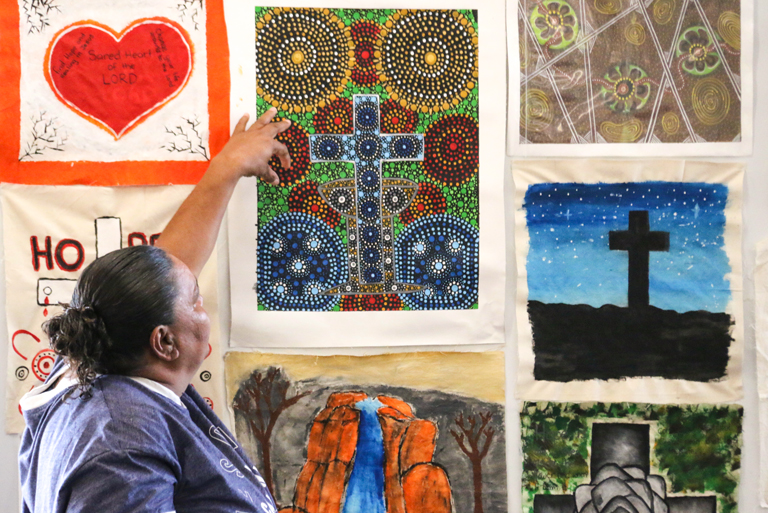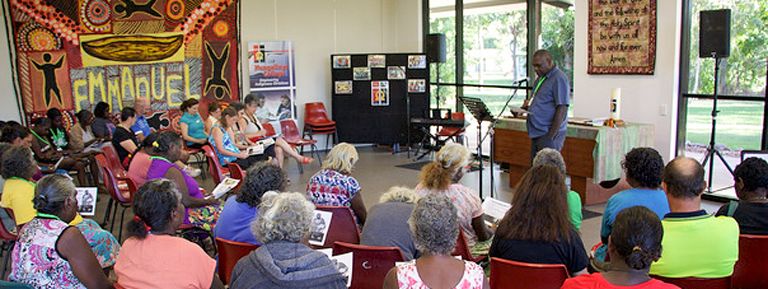Breaking down barriers: Disability and study at Nungalinya College

Wayne Oldfield and Mandy Jones serve at Nungalinya College in Darwin, a Christian training college for Indigenous Australians. With many of their students facing health issues while studying, Wayne reflects here on disability and how the college seeks to care for and be accessible to all their students.
In the account of Jesus healing the crippled man in Mark 2, the man’s friends are faced with some significant barriers. The obvious one is how to get their friend to Jesus. Their ingenuity leads them to the roof, bypassing the crowd, and then they chip away at the mud roof. They remove enough of it to enable the man to be lowered into the room on his mat.
Then the next barrier—acceptance by the community. Jesus graciously forgives the man’s sins. But how dare he do such a thing! Forgive a man who is obviously such a ‘bad’ sinner that he’s crippled? But then Jesus, wanting to accept the man, goes even further in proving his point that the Son of Man has the authority to forgive sins and provide eternal blessing—he heals the man by just telling him to get up. Extraordinary!
At Nungalinya College, we work very hard to care for our students beyond the classroom.
These are some of the key issues that we find in ministering to those less able than ourselves—breaking down barriers of access and acceptance. While I am not an expert, I would like to share some of my experiences up in North Australia, where I serve as Anglican Dean at Nungalinya College, the Indigenous training college of the Northern Territory.
My wife, Mandy, teaches a unit in the Certificate IV course at the college called ‘Children and Families’. In it, they examine the issue of disability in families and Mandy invites me to come into the classroom to give a first-hand account of living with someone with an intellectual disability. My younger brother, Greg, has Down Syndrome, a genetic condition caused by having an extra chromosome 21. Greg is a unique individual, larger than life, quite loud at times and often remembered by many due to his interesting behaviours. He used to have a particular gift for getting lost. He is very loving but is hard to understand due to his poor speech, so talking to him is often like playing charades.
There have been times when I’ve wished I could do what Jesus did. To heal people with a touch, or a word, or a prayer. But would I really want to ‘heal’ Greg of his disability? I’m not sure I can answer, but I have found visiting the class to be very rewarding in reflecting on the joys and pains of living with a family member with a disability. It has also enabled students to share about their own experiences of living with disabled relatives. One particular lady was encouraged because she cares for an adopted daughter with an intellectual disability and felt able to talk about her own situation. Other students have been challenged by what they’ve heard and have followed through by attending the Down Syndrome Association in Darwin for further training and relationship building.

A Chapel service at Nungalinya.
Students with complex health issues
At Nungalinya College, we work very hard to care for our students beyond the classroom. Among Aboriginal people in North Australia, the effect of poor diet and untreated diabetes has contributed to a high incidence of kidney problems. The debilitating effects of renal disease mean that relatively young people are required to undergo renal dialysis, usually three times per week. For many people, this has forced them to relocate to a major centre like Darwin or Katherine, adding the difficulty of being away from family.
Machado Joseph Disease (MJD) has also had a significant effect on some Aboriginal communities. It is a genetic motor neurone disease inherited through a dominant gene. People’s bodies deteriorate while their minds stay sharp, and the next generation is more severely affected than their parents. The disease is fatal and there’s no cure.
As would be expected then, quite a number of our adult students have chronic diseases, or they simply get sick while studying in Darwin. In one Certificate IV class, four students out of the twenty needed to be taken for emergency treatment in hospital in a space of two weeks. Consequently, we have a staff member dedicated to organising and driving students to medical appointments. It has also been very helpful that one of our college hosts is a registered nurse whose expertise and care has been appreciated by the students. The deans also strive to care pastorally for those students with health issues. So what does this look like in practice?
Bianca’s story
One of our students, Bianca*, has MJD. She was wanting to come back to Nungalinya in 2017 and study, but we knew it would be a struggle for her. How could we enable her to come and participate in lessons without making it extremely difficult for our own staff? With the cooperation of the MJD Foundation, set up by former missionaries to help determine the cause of MJD and care for people with the disease, the college was able to develop a plan for Bianca that involved:
- A full-time carer for her. The Aboriginal woman chosen was a relative who was both caring and reliable. Leonie* was a student too but wouldn’t be studying at the same time as Bianca.
- The MJD Foundation funding Leonie’s living and transport costs (given that there is no government funding available to provide carers for people with disabilities at college).
- Meals prepared for Bianca and collected by Leonie which they would eat together in their unit (unlike other students who eat in the dining room).
- A wheelchair to enable Leonie to push Bianca to class. Recent improvements to the paths around the college made this much easier.
- Bianca needing to meet the attendance requirements set by the government.
I was pleased that this plan worked well, overcoming some of the barriers to education faced by people with disabilities. Bianca successfully achieved her Certificate II in Music. I think one of the main reasons it went so well was the care and dedication shown by Leonie, who is a truly loving Christian and committed to serving fellow believers. It was one of my highlights for 2017.
PRAY
Please pray for funding for students with disabilities to come to Nungalinya College and complete their studies. Pray for wisdom, love and care for the staff as they seek to accept people with disabilities and know how to satisfy their learning requirements.
*Names changed for privacy reasons.











































































































